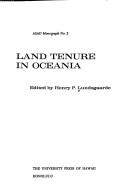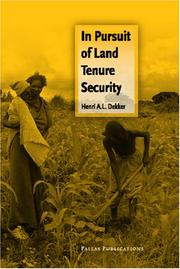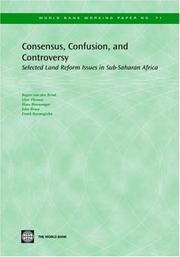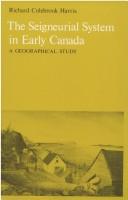| Listing 1 - 10 of 77 | << page >> |
Sort by
|

ISBN: 0416374204 1138149667 9786612777363 1135835543 0203010930 128277736X 9781135835545 9780203010938 0203176952 9780203176955 9780416374209 9781135835491 9781135835538 9781138149663 Year: 1984 Publisher: London Methuen
Abstract | Keywords | Export | Availability | Bookmark
 Loading...
Loading...Choose an application
- Reference Manager
- EndNote
- RefWorks (Direct export to RefWorks)
This pamphlet makes use of the most recent revisionist literature to reassess the view, much propagated by nationalist sources, that Ireland was a land of impoverished peasants oppressed by English laws and absentee English landlords.The land question has always been closely linked to the development of Irish national consciousness, and greatly exercised the minds of English politicians in the latter part of the nineteenth century. The author examines the nature of English understanding of Irish problems, which was often limited or ignorant, and attributes to it much of the unsound and in
Land tenure --- History. --- Political aspects --- Agrarian tenure --- Feudal tenure --- Freehold --- Land ownership --- Land question --- Landownership --- Tenure of land --- Land use, Rural --- Real property --- Land, Nationalization of --- Landowners --- Serfdom

ISBN: 0824803213 0824883721 Year: 1974 Publisher: University of Hawai'i Press
Abstract | Keywords | Export | Availability | Bookmark
 Loading...
Loading...Choose an application
- Reference Manager
- EndNote
- RefWorks (Direct export to RefWorks)
Land tenure --- Agrarian tenure --- Feudal tenure --- Freehold --- Land ownership --- Land question --- Landownership --- Tenure of land --- Land use, Rural --- Real property --- Land, Nationalization of --- Landowners --- Serfdom
Book
ISBN: 3839462665 Year: 2022 Publisher: Bielefeld : transcript,
Abstract | Keywords | Export | Availability | Bookmark
 Loading...
Loading...Choose an application
- Reference Manager
- EndNote
- RefWorks (Direct export to RefWorks)
Die Etablierung von Herrschaft in Nordskandinavien durch das schwedische Königreich im 16. bis 18. Jahrhundert hat sowohl kolonialisierenden wie auch vergleichenden Charakter. Andreas Becker fokussiert auf die von den zentralen Akteuren verwendeten Vergleichspraktiken und stellt deren Produktivität als zentralen Mechanismus von Herrschaftsorganisation heraus. Dabei fasst er die dort entstehenden Beziehungen weder als einseitig-übermächtigend, noch zeichnet er Schweden als einen »guten Kolonisator«. Stattdessen hebt er die Notwendigkeit von Aushandlung in einer innereuropäischen kolonialen Kontaktzone hervor, die bisher nicht auf diese Art untersucht wurde.
Colony. --- Comparison. --- Cultural History. --- Early Modern History. --- Early Modernity. --- European History. --- History of Colonialism. --- History. --- Land Ownership. --- Lappland. --- Power Relations. --- Sweden. --- HISTORY / Europe / General.

ISBN: 9085551110 9786610958665 9048504856 1280958669 142378541X 9781423785415 Year: 2005 Publisher: Amsterdam Pallas Publications
Abstract | Keywords | Export | Availability | Bookmark
 Loading...
Loading...Choose an application
- Reference Manager
- EndNote
- RefWorks (Direct export to RefWorks)
A unique book that takes the reader on an international tour of perceptions of land tenure security.
Land tenure. --- Land use, Rural. --- Rural land use --- Agrarian tenure --- Feudal tenure --- Freehold --- Land ownership --- Land question --- Landownership --- Tenure of land --- Land use --- Agriculture --- Land use, Rural --- Real property --- Land, Nationalization of --- Landowners --- Serfdom
Book
ISBN: 9251074038 925107724X 9789251077245 9789251074039 Year: 2013 Volume: no. 1 Publisher: Rome : Food and Agriculture Organization of the United Nations,
Abstract | Keywords | Export | Availability | Bookmark
 Loading...
Loading...Choose an application
- Reference Manager
- EndNote
- RefWorks (Direct export to RefWorks)
"Gender equality is one of the ten core principles of the Voluntary Guidelines on the Responsible Governance of Tenure of Land, Fisheries and Forests in the Context of National Food Security. This guide aims to assist in its implementation through the achievement of responsible gender-equitable governance of land tenure. The guide focuses on equity and on how land tenure can be governed in ways that address the different needs and priorities of women and men. Gender-equitable governance of land tenure ensures that women and men can participate equally in their relationships to land, through both formal institutions and informal arrangements for land administration and management. The guide provides advice on mechanisms, strategies and actions that can be adopted to improve gender equity in the processes, institutions and activities of land tenure governance."--Publisher's description.
Land tenure --- Equality. --- Government policy. --- Egalitarianism --- Inequality --- Social equality --- Social inequality --- Political science --- Sociology --- Democracy --- Liberty --- Agrarian tenure --- Feudal tenure --- Freehold --- Land ownership --- Land question --- Landownership --- Tenure of land --- Land use, Rural --- Real property --- Land, Nationalization of --- Landowners --- Serfdom

ISBN: 1280253614 9786610253616 0821364413 0821364405 Year: 2005 Publisher: Washington, DC : World Bank,
Abstract | Keywords | Export | Availability | Bookmark
 Loading...
Loading...Choose an application
- Reference Manager
- EndNote
- RefWorks (Direct export to RefWorks)
Land reform can be divided broadly into land tenure reform (the establishment of secure and formalized property rights in land) and land redistribution (the transfer of land from large to small farmers). This paper therefore is in two parts. The first part focuses on property rights, giving a short narrative of some of the key land tenure and land policy issues. Though these issues remain politically sensitive, a solid consensus is emerging on how to deal with them-but only once the confusion is cleared up surrounding private common property and formal and informal rights. The second part addr
Land reform --- Land tenure --- Agrarian tenure --- Feudal tenure --- Freehold --- Land ownership --- Land question --- Landownership --- Tenure of land --- Land use, Rural --- Real property --- Land, Nationalization of --- Landowners --- Serfdom --- Agrarian reform --- Economic policy --- Social policy --- Agriculture and state

ISBN: 0773504346 0773504311 9786612850707 0773560998 1282850709 9780773560994 Year: 1984 Publisher: Kingston : McGill-Queen's University Press,
Abstract | Keywords | Export | Availability | Bookmark
 Loading...
Loading...Choose an application
- Reference Manager
- EndNote
- RefWorks (Direct export to RefWorks)
This was the seigneurial system of land tenure, whose legal structure was transferred alsmot unaltered from France to the New World. Although the system was old and effete in seventeenth-century France, scholars have considered that it shaped much of the life of early Canada. Harris argues in this classic study, now available in paper for the first time, that such was not the case. If the seigneurial system were central to the development of early Canadian society, the patterns of settlement, land use, and trade in the colony would have borne the imprint of the system. Through inspection of such records as deeds of land concession and sale, statements of vassalage, and wills, Harris reconstructs the geography of Canada before the British conquest. This evidence leads to novel and interesting conclusions: that the seigneurie was not an important unit on the land and the seigneur was not a dominant figure in the life of the community. With remarkable clarity, Harris unfolds a detailed picture of the landscape of early Canada and of the people who created it. The reissue of this important volume will be welcomed by all interested in early European societies in North America.
Feudalism --- Land tenure --- Propriété foncière --- Agrarian tenure --- Feudal tenure --- Freehold --- Land ownership --- Land question --- Landownership --- Tenure of land --- Land use, Rural --- Real property --- Land, Nationalization of --- Landowners --- Serfdom --- History. --- Canada --- History --- E-books

ISBN: 0415303737 0203355628 1280059729 0203608704 0415649579 9780203608708 9786610059720 6610059721 9781134411016 9781134410965 9781134411009 9780415303736 9780415649575 1134411006 Year: 2005 Publisher: London ; New York, NY : RoutledgeCurzon,
Abstract | Keywords | Export | Availability | Bookmark
 Loading...
Loading...Choose an application
- Reference Manager
- EndNote
- RefWorks (Direct export to RefWorks)
This book examines the relationship between land tenure, conservation and rural development in the context of the Southeast Asian archipelago and is particularly concerned with people living in and around national parks and other protected areas.
Land tenure --- Land use, Rural --- Rural development --- Rural land use --- Land use --- Agriculture --- Agrarian tenure --- Feudal tenure --- Freehold --- Land ownership --- Land question --- Landownership --- Tenure of land --- Real property --- Land, Nationalization of --- Landowners --- Serfdom
Book
ISBN: 9956550914 9789956550913 Year: 2019 Publisher: Oxford
Abstract | Keywords | Export | Availability | Bookmark
 Loading...
Loading...Choose an application
- Reference Manager
- EndNote
- RefWorks (Direct export to RefWorks)
Colonial scholars have taken immense pleasure in portraying Africans as possessed by spirits but as lacking possession and ownership of their resources, including land. Erroneously deemed to be thoroughly spiritually possessed but lacking senses of material possession and ownership of resources, Africans have been consistently dispossessed and displaced from the era of enslavement, through colonialism, to the neocolonial era. Delving into the historiography of dispossession and displacement on the continent of Africa, and in particular in Zimbabwe, this book also tackles contemporary forms of dispossession and displacement manifesting in the ongoing transnational corporations land grabs in Africa, wherein African peasants continue to be dispossessed and displaced. Focusing on the topical issues around dispossession and repossession of land, and the attendant displacements in contemporary Zimbabwe, the book theorises displacements from a decolonial Pan-Africanist perspective and it also unpacks various forms of displacements -- corporeal, noncorporeal, cognitive, spiritual, genealogical and linguistic displacements, among others. The book is an excellent read for scholars from a variety of disciplines such as Geography, Sociology, Social Anthropology, History, Linguistics, Development Studies, Science and technology Studies, Jurisprudence and Social Theory, Law and Philosophy. The book also offers intellectual grit for policy makers and implementers, civil society organisations including activists as well as thinkers interested in decolonisation and transformation.
Decolonization --- Land tenure --- Land reform --- Sovereignty --- Autonomy and independence movements --- Colonization --- Postcolonialism --- Agrarian tenure --- Feudal tenure --- Freehold --- Land ownership --- Land question --- Landownership --- Tenure of land --- Land use, Rural --- Real property --- Land, Nationalization of --- Landowners --- Serfdom --- History. --- History --- E-books
Book
ISBN: 3944773330 3944773322 Year: 2021 Publisher: Frankfurt am Main Max Planck Institute for Legal History and Legal Theory
Abstract | Keywords | Export | Availability | Bookmark
 Loading...
Loading...Choose an application
- Reference Manager
- EndNote
- RefWorks (Direct export to RefWorks)
This book examines the social construction of legal relations between people and things in Brazil during the 19th century through the analysis of court cases discussing dominion and possession over slaves and land. The chapters address topics such as the role of social recognition in situations of possession, the process of delegitimizing acts of land usage from indigenous peoples, dependent persons and women, and the widespread illegal acquisition of slaves and land.
| Listing 1 - 10 of 77 | << page >> |
Sort by
|

 Search
Search Feedback
Feedback About UniCat
About UniCat  Help
Help News
News